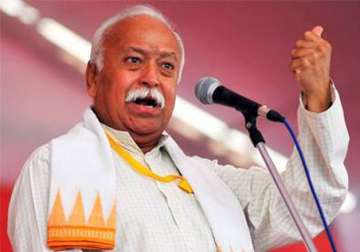Ranchi: Stoking a fresh debate over religion and demograpics, the RSS on Saturday sought a review of the population policy to counter “severe demographic changes” in India, flagging what it considers a high rate of growth among Muslims in the country.
The RSS, which deliberated upon the population issue at a meeting here and passed a resolution, said the religion data of Census 2011 highlighted the necessity of the review of population policy which was formulated in 2000.
Briefing the media on the deliberations, RSS Sah-Sarakaryavah (joint secretary) Krishna Gopal said the resolution urged the Centre to re-formulate the National Population Policy keeping in view the availability of resources in the country, future needs and the "problem of demographic imbalance".
The Census 2011 had showed that the Muslim community has registered 0.8 per cent growth to touch 17.22 crore in the 10 years between 2001 and 2011, up from 13.8 crore, while the population of Hindus showed a decline by 0.7 per cent at 96.63 crore during the period.
Quoting the RSS resolution, Gopal said although India was one of the early countries in the world to announce as early as 1952 that it will have population planning measures, it was only in 2000 that a comprehensive population policy was formulated and a population commission was formed.
The policy, he said, aimed at achieving a stable but healthy population by 2045 by optimising the fertility rate to the ideal figure of 2.1 total fertility rate (TFR) and it was expected that it would be applied uniformly to all sections of the society as this aim was in accordance with the national resources and expected future requirements.
However, the National Fertility & Health Survey (NFHS) of 2005-06 and the 0-6 age group population percentage data of religion in Census 2011, both indicate that the TFR and child ratio "is uneven across the religions", he said.
Specifically referring to North East, the RSS said termed the "religious imbalance" of population there as serious. It said in 1951 the Indian-origin people in Arunachal Pradesh were 99.21 per cent but it came down to 81.3 per cent in 2001 and to 67 per cent in 2011.
Turning to Manipur, the RSS resolution said the state's share of Indian origin population decreased to 50 per cent in 2011 from more than 80 per cent found in 1951.
These examples and pointers of "unnatural growth..." in many districts of the nation indicate a "targeted religious conversion" activity by some vested interests, it said.
The resolution also sought total curb on infiltration from across the border, preparation of National Register of Citizens and preventing the infiltrators from acquiring citizenship rights and purchasing land.
"..The infiltrators are usurping the rights of citizens of these states and are becoming a heavy burden on the already scant resources apart from creating socio-cultural, political and economic tensions," the resolution said.
Latest India News
